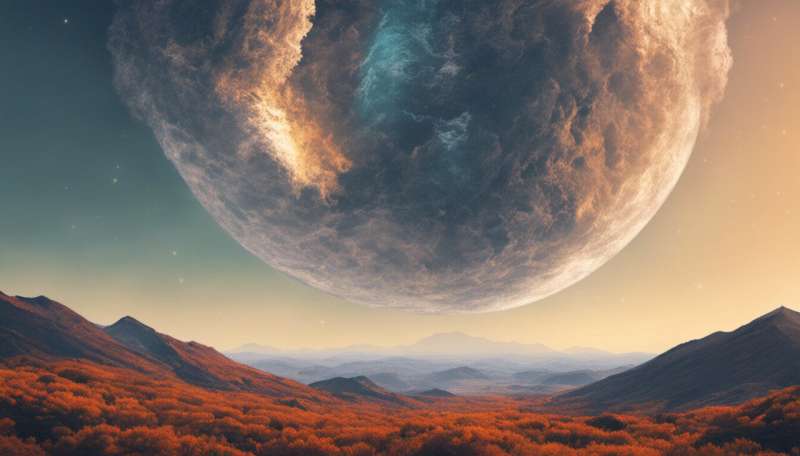Would Humans Evolve Again if We Rewound Time

What would happen if the hands of time were turned dorsum to an arbitrary point in our evolutionary history and we restarted the clock? American paleontologist Stephen Jay Gould proposed this famous idea experiment in the late 1980s—and it's one that all the same grips the imagination of evolutionary biologists today.
Gould reckoned that if fourth dimension was rewound, and then evolution would bulldoze life downward a completely dissimilar path and humans would never re-evolve. In fact, he felt humanity's evolution was so rare that we could replay the tape of life a million times and we wouldn't see anything like Homo sapiens ascend over again.
His reasoning was that chance events play a huge role in evolution. These include mammoth mass extinction events – such every bit cataclysmic asteroid impacts and volcanic eruptions. Just chance events also operate at the molecular scale. Genetic mutation, which forms the ground of evolutionary adaptation, is reliant on chance events.
Put only, evolution is the product of random mutation. A rare few mutations can improve an organism's chance of survival in certain environments over others. The split from one species into two starts from such rare mutations that get common over fourth dimension. Merely further random processes tin can still interfere, potentially leading to a loss of beneficial mutations and increasing harmful mutations over time. This inbuilt randomness ought to suggest you'd get dissimilar life forms if yous replayed the tape of life.
Of course, in reality, it'southward impossible to plough back the clock in this way. We'll never know for sure simply how likely it was to have arrived at this moment—for the states to have written this article, and for you to be reading it. Fortunately, however, experimental evolutionary biologists do have the means to test some of Gould's theories on a microscale with bacteria.
Microorganisms divide and evolve very quickly. We can therefore freeze billions of identical cells in time and store them indefinitely. This allows us to take a sub-set of these cells, challenge them to grow in new environments and monitor their adaptive changes in real time. Nosotros can go from the "nowadays" to the "future" and back over again as many times as we like—substantially replaying the tape of life in a test tube.

Evidence of evolutionary fate
Many bacterial evolution studies have found, mayhap surprisingly, that development often follows very predictable paths over the brusk term, with the aforementioned traits and genetic solutions oft realised. Consider, for example, a long-term experiment, in which 12 independent populations of Escherichia coli founded by a single clone, accept been continuously evolving since 1988. That's over 65,000 generations—at that place have merely been 7,500-x,000 generations since modern Homo sapiens appeared. All the evolving populations in this experiment evidence higher fettle, faster growth and larger cells than their ancestor. This suggests that organisms have some constraints on how they can evolve.
At that place are evolutionary forces that keep evolving organisms on the straight-and-narrow. Natural selection is the "guiding hand" of evolution, reigning in the chaos of random mutations and abetting beneficial mutations. This means many genetic changes will fade from existence over time, with but the best enduring. This can as well atomic number 82 to the same solutions of survival being realised in completely unrelated species.
We discover evidence for this in evolutionary history where species that are not closely related, but share similar environments, develop a similar trait. For example, extinct pterosaurs and birds both evolved wings also as a distinct beak, but not from a recent common ancestor. So substantially wings and beaks evolved twice, in parallel, considering of evolutionary pressures.
But genetic architecture is besides important. Not all genes are created equal: some accept very important jobs compared to others. Genes are frequently organised into networks, that are comparable to circuits, complete with redundant switches and "principal switches". Mutations in "primary switches" naturally event in much bigger changes, because of the knock-on effect felt past all genes under its control. This means that certain locations in the genome will contribute to evolution more frequently, or with a larger effect, than others—biasing evolutionary outcomes.

Physical laws
Merely what about the underlying physical laws—do they favour predictable evolution? At very large scales, information technology appears so. We know of many governing laws of our universe that are certain. Gravity, for example—for which we owe our oceans, thick atmosphere and the nuclear fusion in the sun that showers us with energy—is a predictable force. Isaac Newton's theories, based on large calibration deterministic forces, can as well be used to describe many systems on large scales. These depict the universe as perfectly predictable.
If Newton'south view was to remain perfectly truthful, the evolution of humans was inevitable. Nonetheless, this comforting predictability was shattered by the discovery of the contradictory only fantastical world of quantum mechanics in the 20th century. At the smallest scales of atoms and particles, true randomness is at play—meaning our earth is unpredictable at the most fundamental level.
This means that the broad "rules" for evolution would remain the same no matter how many times we replayed the tape. In that location would always be an evolutionary advantage for organisms that harvest solar power. There would ever exist opportunity for those that make use of the abundant gases in the atmosphere. And from these adaptations, we may predictably see the emergence of familiar ecosystems. Simply ultimately, randomness, which is built into many evolutionary processes, will remove our power to "see into the hereafter" with complete certainty.
In that location'southward a problem in astronomy that acts equally a fitting analogy. In the 1700s, a mathematical institute offered a prize for solving the "iii-body problem", involving accurately describing the gravitational relationship and resultant orbits of the sun, Earth and moon.
The winner, Joseph-Louis Lagrange, essentially proved that the trouble couldn't be solved exactly. Much like the anarchy introduced by random mutations, a little fleck of starting fault would inevitably grow, meaning that you couldn't hands make up one's mind where the three bodies would end upwardly in the future. But as the dominant partner, the dominicus dictates the orbits of all three to an extent – allowing us to narrow the possible positions of the bodies to within a range.
This is much like the guiding easily of development, which tether adapting organisms to familiar routes. Nosotros may not be entirely sure where we'd terminate upward if nosotros rewound fourth dimension, but the paths available to evolving organisms are far from limitless. And then maybe humans would never appear again, simply information technology's likely that any conflicting earth replaced ours would be a familiar place.
This commodity is republished from The Conversation under a Artistic Eatables license. Read the original article.![]()
Citation: Why humans (or something very similar) may accept been destined to walk the Earth (2019, June 6) retrieved 24 Apr 2022 from https://phys.org/news/2019-06-humans-like-destined-globe.html
This document is field of study to copyright. Apart from any off-white dealing for the purpose of private study or research, no part may be reproduced without the written permission. The content is provided for information purposes only.
Source: https://phys.org/news/2019-06-humans-similar-destined-earth.html
0 Response to "Would Humans Evolve Again if We Rewound Time"
Post a Comment